Why this resume works
- Quantifies accomplishments: By detailing measurable accomplishments like a 20% cost reduction in circuit board design, the applicant effectively illustrates their tangible impact on company performance.
- Highlights industry-specific skills: Highlighting skills in power systems development and circuit design, the applicant aligns their expertise with industry needs, emphasizing their readiness for roles in electronic engineering.
- Illustrates problem-solving ability: Implementing testing procedures that boosted efficiency by 30% showcases the applicant’s ability to apply problem-solving skills and drive significant operational improvements.
More Electronic Engineer Resume Examples
Our electronic engineer resume examples show how to feature your technical skills, project experience, and innovation. Use these electrical engineering resume samples to create a resume that showcases your expertise and sets you apart in engineering roles.
Entry-Level Electronic Engineer
Why this resume works
- Effective use of keywords: Strategically incorporating role-relevant terms like PCB design and firmware development aligns with keywords, ensuring compatibility with modern ATS systems while emphasizing core technical strengths.
- Shows digital literacy: Tools like embedded systems and microcontroller programming, paired with expertise in signal processing, illustrate the applicant’s robust computer skills necessary for today’s tech-driven roles.
- Centers on academic background: Earning a master’s from Stanford and a bachelor’s from Berkeley reflects an impressive academic foundation, showcasing readiness to tackle complex engineering challenges early in their career.
Mid-Level Electronic Engineer
Why this resume works
- Points to measurable outcomes: Highlighting quantifiable achievements like reducing risk by 20% shows the applicant’s impact on improving safety and efficiency in their projects.
- Demonstrates language abilities: Fluency in Spanish, German, and Japanese supports language skills, enabling effective communication in diverse international teams.
- Displays technical expertise: Certifications like Certified Electronics Technician and Project Management Professional reflect the applicant’s commitment to maintaining high standards of technical expertise.
Experienced Electronic Engineer
Why this resume works
- Lists relevant certifications: Listing certifications like Certified Electronics Technician and PMP shows dedication to expertise and continuous learning, improving the applicant’s credibility in electronics and project management.
- Showcases impressive accomplishments: Impressive accomplishments, such as a 35% circuit efficiency boost and $200K cost reduction, highlight the applicant’s ability to deliver significant business impact and senior-level performance.
- Emphasizes leadership skills: By leading teams of engineers at TechDynamics Inc. and managing cross-functional projects at Innovative Circuits Ltd., the applicant showcases strong leadership skills essential for driving successful project execution.
Electronic Engineer Resume Template (Text Version)
Tao Miller
Detroit, MI 48211
(555)555-5555
Tao.Miller@example.com
Professional Summary
Experienced electronic engineer skilled in circuit design reducing costs and enhancing efficiency. Proven track record in developing power systems, optimizing workflows, and leading high-impact projects in EEE domain.
Skills
- Circuit Design
- Signal Processing
- Testing Procedures
- Power Systems Development
- Quality Assurance
- Workflow Optimization
- Project Management
- Manufacturing Streamlining
Certifications
- Certified Electronics Technician – International Society of Certified Electronics Technicians
- Advanced RF System Design – Institute of Electrical and Electronics Engineers
Education
Master of Science Electrical Engineering
California Institute of Technology Pasadena, CA
December 2016
Bachelor of Science Electronics and Communications
University of California, Berkeley Berkeley, CA
December 2014
Work History
Electronic Engineer
Innovatech Solutions – Detroit, MI
January 2023 – July 2025
- Designed circuit boards, reducing costs by 20%
- Enhanced product quality, leading to 15% fewer defects
- Implemented testing procedures increasing efficiency 30%
Electrical Design Specialist
Tech Wave Corp – Southgate, MI
January 2019 – December 2022
- Developed power systems saving K annually
- Collaborated on projects boosting performance by 25%
- Streamlined manufacturing process by 18%
Circuit Design Engineer
NextGen Circuits Inc. – Southgate, MI
January 2017 – December 2018
- Created efficient designs reducing waste by 10%
- Optimized workflows improving delivery times by 12%
- Led team on key projects enhancing outputs by 22%
Languages
- Spanish – Beginner (A1)
- German – Beginner (A1)
- Chinese – Beginner (A1)
Related Resume Guides
Advice for Writing Your Electronic Engineer Resume
Explore our tips on how to write a resume for an electronic engineer position and discover how to highlight your technical skills, project experience, and problem-solving abilities.
Highlight relevant technical skills
Technical skills are essential for success as an electronic engineer. They demonstrate your ability to solve complex problems, work with specialized tools, and contribute to real-world engineering projects. Add a dedicated skills section to your resume to make these skills easy for employers to spot.
This section gives hiring managers a quick overview of your core competencies. You can also reinforce these skills by integrating them into your work experience. For example, instead of just listing “circuit design,” describe how you designed and tested custom circuits for a specific product or project. This approach shows not only what you know, but how you’ve applied your expertise in practical situations.
Common technical skills for electronic engineers include circuit design, microcontroller programming, signal processing, and PCB layout. Proficiency with CAD tools like AutoCAD, SolidWorks, or Altium Designer is often expected, as is experience using testing equipment such as oscilloscopes, logic analyzers, and multimeters. Familiarity with embedded systems, VLSI design, and hardware debugging is also valuable, depending on the role.
When describing your skills, keep your language clear and specific so that both technical and non-technical readers can quickly understand your strengths. Whether you list them separately or highlight them within project descriptions, showcasing your technical know-how is key to standing out in a competitive field.
Example of a technical skills section
- Circuit design and simulation (SPICE, Altium Designer)
- Embedded systems programming (C/C++, VHDL, Verilog)
- Signal processing and analysis
- PCB layout design
- Microcontroller interfacing and programming
- Analog and digital electronics
- RF system design and testing
- Hardware troubleshooting and repair
You can use our Resume Builder to easily create a resume that showcases your unique skills and qualifications to stand out to hiring managers.
Quantify your accomplishments
Quantifying your accomplishments on a resume makes it more impactful by showing employers the real results you’ve delivered.
Instead of simply listing responsibilities, use measurable outcomes, such as percentages, time saved, cost reductions, or efficiency gains, to highlight your contributions as an electronic engineer. In the work experience section, include your job title, employer name, location, and dates of employment.
Then, focus on turning duties into achievements. Use strong action verbs and specific metrics to demonstrate the value you brought to each role.
For example, rather than saying “managed electronic projects,” try “led electronic projects that cut production costs by 20% and boosted system efficiency by 30%.”
This results-driven approach helps hiring managers quickly understand your capabilities and the impact of your work. It shows that you’re not just completing tasks—you’re driving improvements and delivering tangible results.
By highlighting quantified achievements, you provide clear, compelling evidence of your skills and effectiveness, making your resume more competitive and increasing your chances of landing an interview.
5 electronic engineer work history bullet points
- Developed and tested electronic circuits for consumer electronics, reducing production costs by 15%.
- Led a team of 4 engineers in designing embedded systems, resulting in a 20% increase in product reliability.
- Implemented automated testing procedures for PCB designs, decreasing testing time by 25%.
- Collaborated with cross-functional teams to integrate new technologies into existing products, improving performance by 18%.
- Conducted failure analysis on malfunctioning components, improving overall system efficiency by 12%.
Struggling to make your resume stand out? Check out these professional resume examples to get ideas on how to organize and show off your experience.
Write a powerful professional summary
A professional summary is a brief introduction on your resume that grabs hiring managers’ attention. It provides a quick look at who you are as a professional and what you’ve achieved. When creating your resume, you’ll need to choose between writing a professional summary or a resume objective.
A professional summary is three to four sentences long and highlights your experience, skills, and key achievements. It’s ideal for those with some work history, like an electronic engineer who’s been in the field for several years. The goal is to showcase your professional identity and the value you bring.
Conversely, a resume objective focuses on career goals rather than past accomplishments. This approach is better suited for entry-level applicants, those changing careers, or individuals returning to work after a break. Think of it as “what I’ve accomplished” versus “what I aim to contribute.”
Next, we’ll explore examples of both summaries and objectives tailored to various industries and experience levels to help you craft your compelling introduction.
Electronic engineer resume summary examples
Entry-level
Recent electrical engineering graduate with a Bachelor of Science in electrical engineering from an ABET-accredited university. Completed internships and academic projects focused on circuit design, microcontrollers, and power systems. Certified in AutoCAD Electrical and familiar with MATLAB and LabVIEW for simulations. Eager to contribute skills in electronics design and testing within a dynamic engineering team.
Mid-career
Accomplished electronic engineer with over six years of experience in designing and implementing complex electronic systems within the telecommunications industry. Proven track record in project management, leading teams through full product development cycles from concept to production. Proficient in C/C++ programming, PCB design, and RF technology integration. Recognized for improving system efficiency and reducing production costs.
Experienced
Veteran electronic engineer specializing in embedded systems and digital signal processing with over 15 years of industry expertise. Expert in leading cross-functional teams to develop cutting-edge technologies across consumer electronics sectors. Holds multiple patents for innovative circuit designs that have significantly improved device performance and reliability. Committed to fostering technological advancements while mentoring emerging engineers.
Electronic engineer resume objective examples
Recent graduate
Driven recent graduate with a Bachelor of Science in electronic engineering eager to secure an entry-level position. Aims to apply academic knowledge in circuit design and embedded systems to contribute effectively to innovative projects within a forward-thinking company.
Career changer
Passionate professional transitioning into electronic engineering, leveraging a background in computer science and problem-solving skills acquired through technical roles. Committed to contributing fresh perspectives and learning new technologies while supporting team goals in electronics development.
Specialized training
Entry-level electronic engineer with specialized training in microcontroller programming and signal processing seeking an opportunity at a tech-driven firm. Focused on using unique skill sets to aid in the creation of cutting-edge electronic solutions that improve product functionality.
Opt for a resume template that’s clean and simple with clear headings and fonts, avoiding excessive graphics or colors to help employers easily identify your skills and experience.
Showcase your credentials
Listing your credentials as an electronic engineer is essential. Certifications, licenses, and specialized training show you know your stuff and can handle complex projects.
In technical fields like electronics, these credentials make you stand out to employers who are looking for skilled professionals. It’s a good idea to have a certifications section on your resume so these achievements are easy to find. This section can complement your education details to offer a full picture of your skills.
Here are a few examples of certifications for an electronic engineer resume:
- Certified Electronics Technician (CET)
- IPC Certified Interconnect Designer (CID)
- Certified LabVIEW Associate Developer (CLAD)
- AutoCAD Electrical Certification
- Embedded Systems Certification (Coursera, edX, or similar platforms)
Having these certifications can help you do well as an electronic engineer. They show that you’re up-to-date with the latest technologies and ready for new challenges. Employers will see you as someone who is committed to growing in their field.
Example of a certifications section
Certified Electronic Technician (CET)
Issued by: Electronics Technicians Association (ETA)
Issued 2022
Cisco Certified Network Associate (CCNA)
Issued by: Cisco Systems
Expires 2025
IEEE Certified Biometrics Professional (CBP)
Issued by: Institute of Electrical and Electronics Engineers (IEEE)
Issued 2021
Project Management Professional (PMP)
Issued by: Project Management Institute (PMI)
Expires 2024
FE Electrical and Computer
Issued by: National Council of Examiners for Engineering and Surveying (NCEES)
Issued 2023
Use a polished resume format that aligns with your experience level to ensure your skills and qualifications get noticed by hiring managers.
Salary Insights for Electronic Engineers
Thinking about your next job or considering a move to a new city? Research salary information and job market trends to get a better idea of what to expect. Explore key insights below.
Top 10 highest-paying states for electronic engineers
Electronic Engineers earn varying salaries across the United States, with a national average of $77,630. The table below highlights the states where electronic engineers command the highest compensation.
Our salary information comes from the U.S. Bureau of Labor Statistics’ Occupational Employment and Wage Statistics survey. This official government data provides the most comprehensive and reliable salary information for writers across all 50 states and the District of Columbia. The figures presented here reflect the May 2025 dataset, which is the most recent available as of this publication.
| State | Average Salary |
|---|---|
| District of Columbia | $106,490 |
| Maryland | $95,550 |
| Alaska | $91,590 |
| California | $90,560 |
| Rhode Island | $89,860 |
| Hawaii | $89,660 |
| Wyoming | $88,590 |
| Washington | $88,450 |
| Maine | $87,360 |
| Virginia | $87,760 |
FAQ
Do I need to include a cover letter with my electronic engineer resume?
Yes, including a cover letter with your electronic engineer resume is a smart move. A cover letter allows you to highlight why you’re drawn to the specific role and company, emphasizing key projects or technologies that align with their needs.
For instance, if the company develops cutting-edge communication systems, you could mention any related experience or projects you’ve worked on that demonstrate your expertise.
Consider using tools like our Cover Letter Generator to create a custom cover letter by aligning it closely with your resume details and improving it with industry-specific language.
Additionally, reviewing cover letter examples tailored to engineering roles can provide ideas on how to effectively structure and style your own.
How long should an electronic engineer’s resume be?
For an electronic engineer, a one-page resume is usually enough to highlight your key skills and experiences, especially if you’re early in your career. Focus on showcasing your skill with essential tools like CAD software, circuit design, and any relevant projects or internships.
If you have extensive experience or specialized certifications, a two-page resume can work well. Just make sure every detail is relevant—your roles in complex design projects or leadership in technical teams should stand out.
To figure out how long a resume should be at different career stages, check out our guide for examples and tips.
How do you write an electronic engineer resume with no experience?
If you have no professional experience, focus your electronic engineer resume on your education, skills, and any relevant projects or internships that showcase your potential in the field. Here are some tips to help you build a resume with no experience:
- Highlight your education: Start with your degree in electronic engineering, including the name of your school, graduation date, and any honors or relevant coursework.
- Showcase projects and internships: Include details of any projects or internships you’ve completed during your studies. Describe what you worked on specifically—such as designing circuits, programming microcontrollers, or working with sensors—and emphasize your role and accomplishments.
- Emphasize technical skills: Make sure to list key skills like circuit design, PCB layout software (e.g., Eagle or Altium), programming languages (e.g., C++, Python), and familiarity with lab equipment. These will show you’re ready to tackle real-world challenges.
- Include relevant extracurriculars: If you’ve participated in engineering clubs, competitions (like IEEE), or workshops related to electronics, mention these experiences as they demonstrate initiative and practical knowledge.
Use this structure to highlight how your academic background and hands-on experiences have prepared you for a career in electronic engineering.
Rate this article
Electronic Engineer
Additional Resources
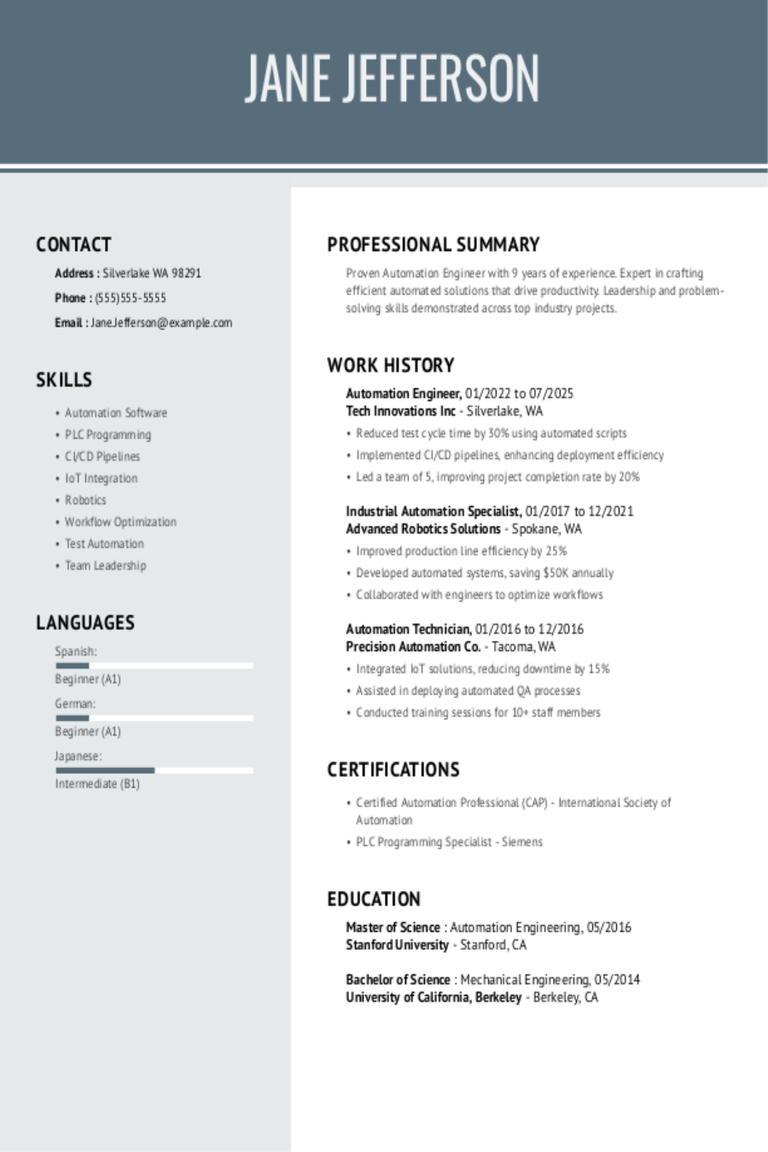
Automation Engineer Resume Examples & Templates for 2025
Automation engineers play a vital part in modern industries and businesses. They aim to enhance efficiency by designing, developing and implementing systems that automate different tasks and processes. Explore our guide
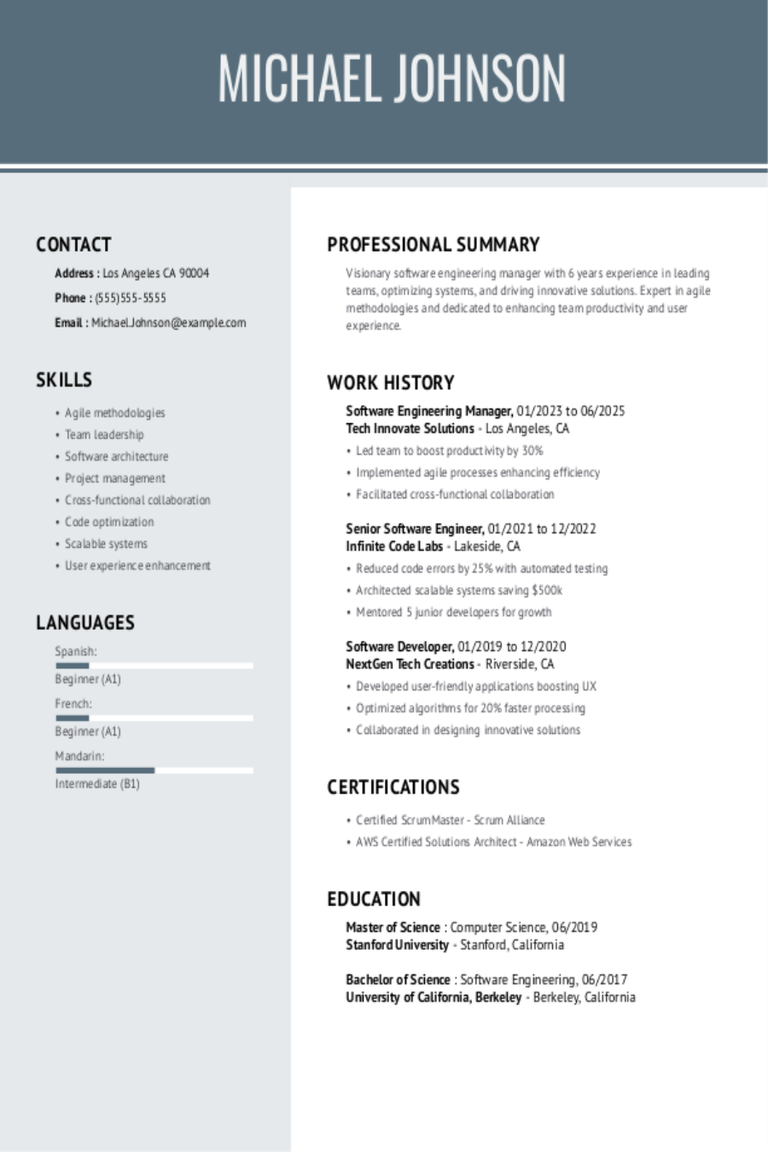
Software Engineering Manager Resume Examples & Templates for 2025
A great job as a software engineering manager demands a perfect software engineering manager resume and we are here to help you create one. Our guide to crafting a perfect
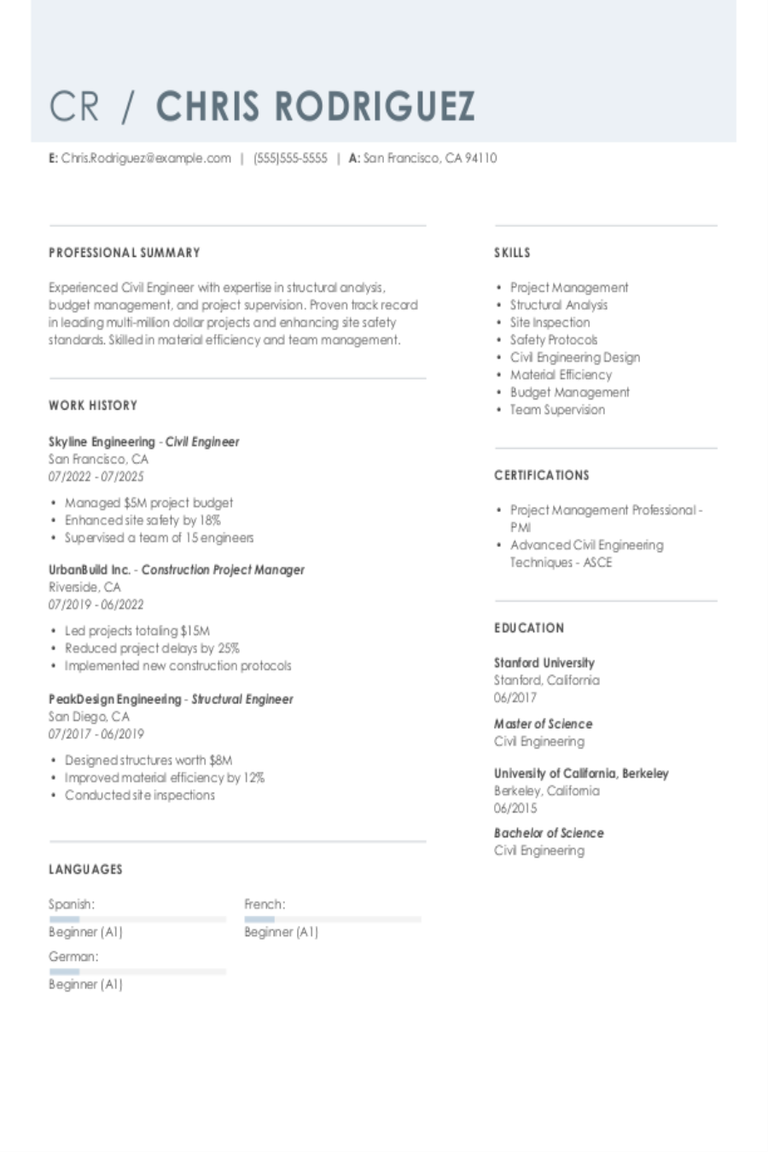
Civil Engineer Resume Examples & Templates for 2025
Entry-level
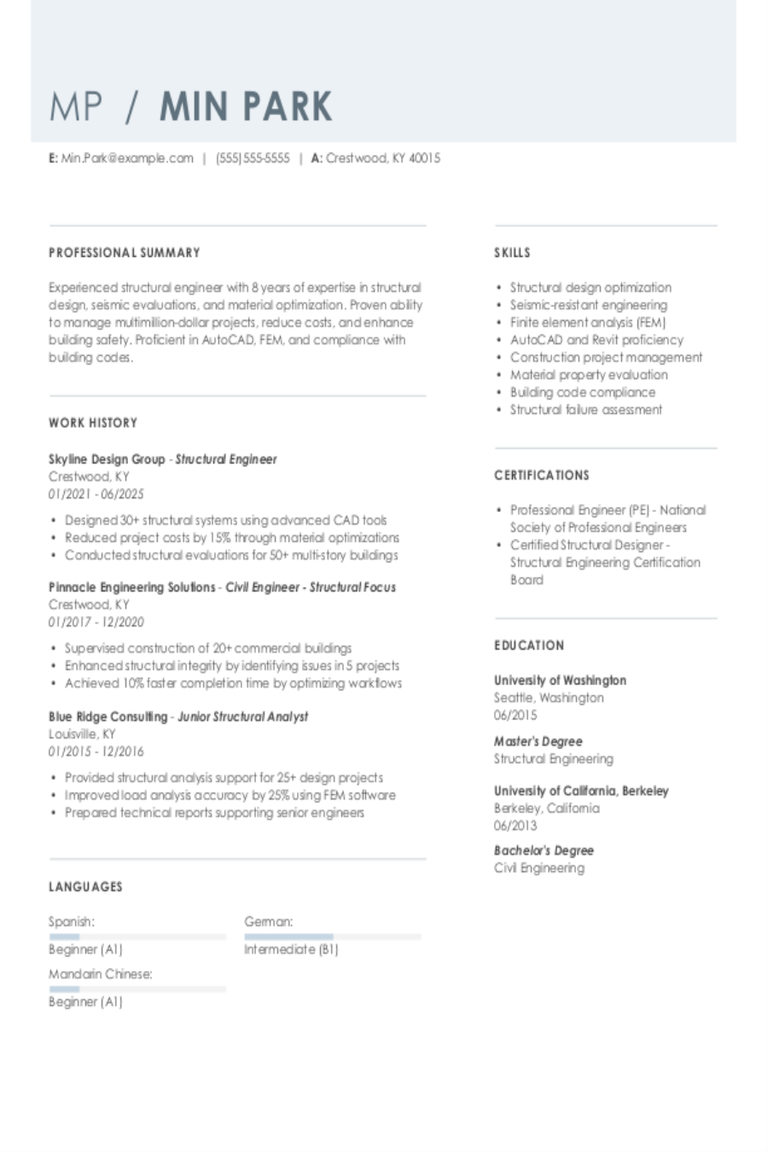
Structural Engineer Resume Examples & Templates for 2025
Being a structural engineer is an exciting job that involves designing and constructing buildings and other structures. Structural engineers must have a strong understanding of engineering principles, mathematics and physics,
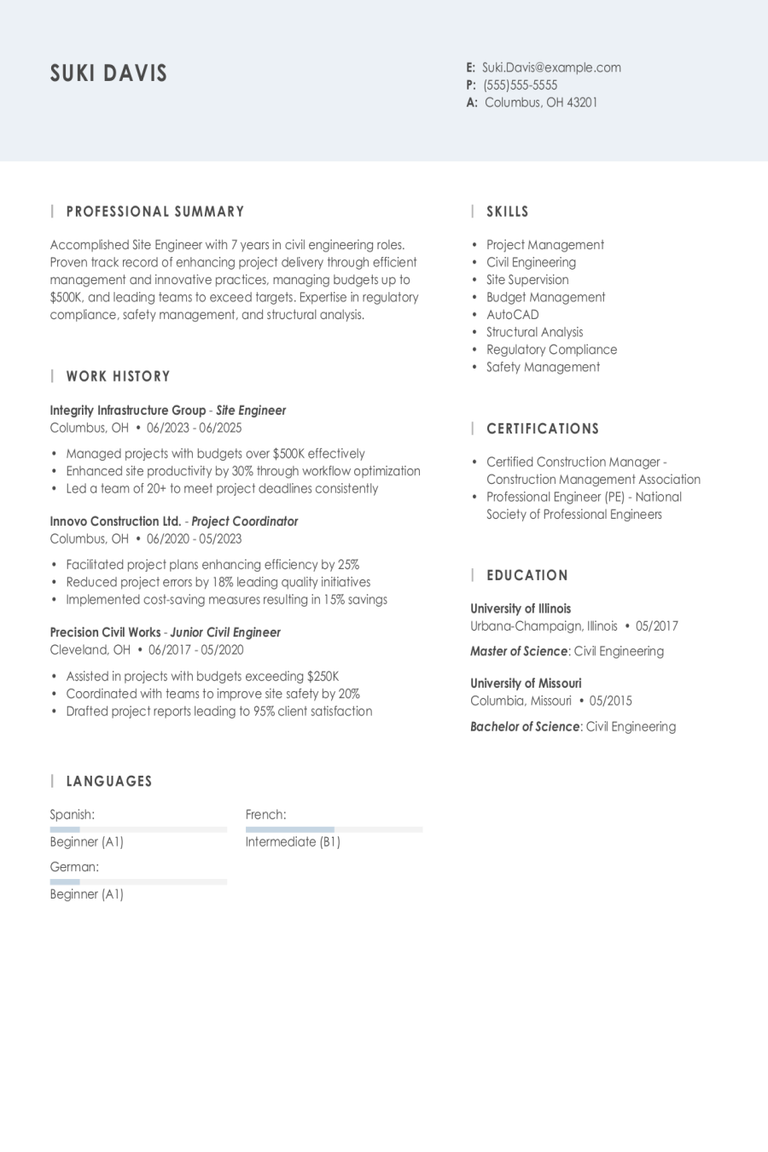
Site Engineer Resume Examples & Templates for 2025
Seeking a job as a site engineer? A well-written Resume is a great place to start, and we’re here to help! This guide to writing an effective site engineer Resume
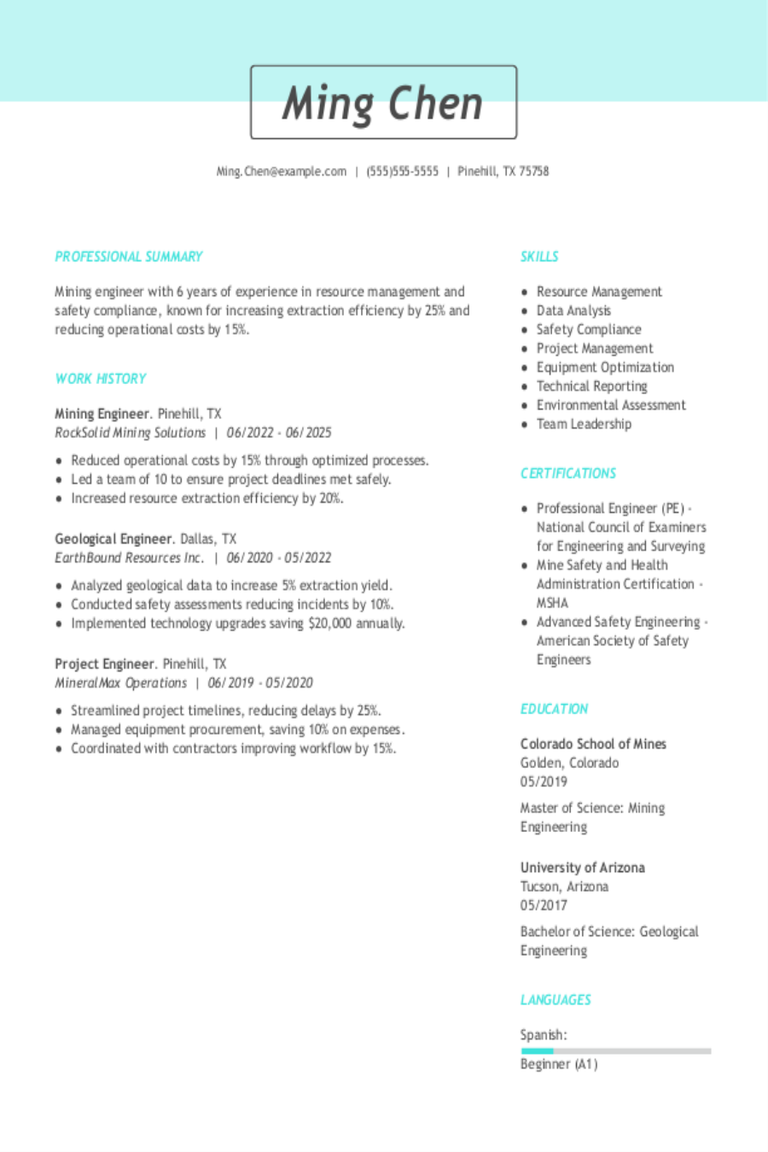
Mining Engineer Resume Examples & Templates for 2025
A great job as a mining engineer demands a perfect mining engineer resume. Not sure what that looks like? Don’t worry! We’re here to help you create one. Our guide
